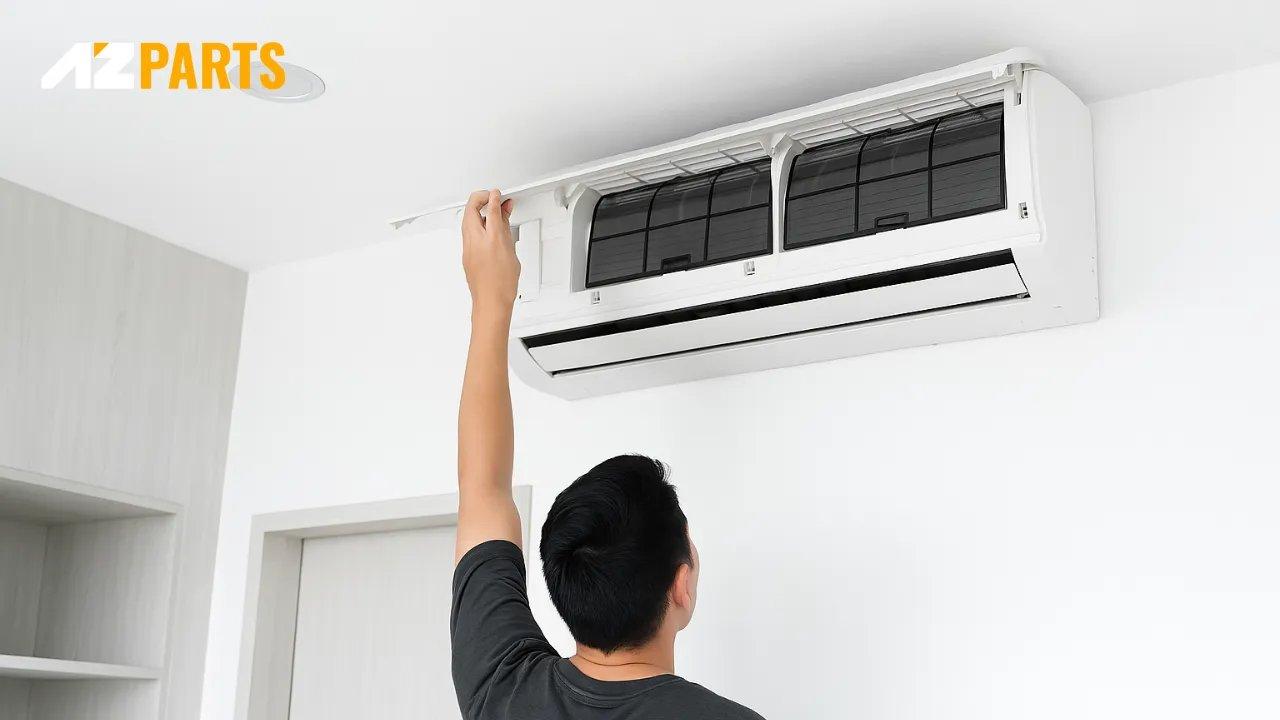Repair help
Why Does My Air Conditioner Smell? Causes & Fixed
AZparts Team
Updated on July 31, 2025
7 min read
If you’ve ever wondered: “Why does my air conditioner smell?”, you’re not alone. A strange odor coming from your AC can be more than just unpleasant, it could signal underlying problems that need attention. In this guide, we’ll break down the top 7 common air conditioner smells, what they mean, and how to fix them. Plus, you’ll find practical tips to prevent AC odors from coming back. For trusted HVAC parts and solutions, don’t forget to check out AZParts.

1. Top 7 Common Air Conditioner Smells & How to fix
Air conditioner odors are not only annoying but can also indicate different issues with the HVAC system. Here are the 7 most common AC smells and what they usually mean:
1.1. Musty or Moldy Smell
A musty or moldy smell coming from your AC often means that moisture is trapped inside the unit due to a damaged cover or a leaky piercing valve. When these parts wear out or crack, they allow humidity to build up by creating the perfect environment for mold and mildew to grow inside the system.
Solution: The best way to prevent this is to regularly clean your air conditioner, especially the outer cover and airflow vents where moisture and dust often build up. Moldy smells usually come from areas that trap dirt or stay damp for too long.
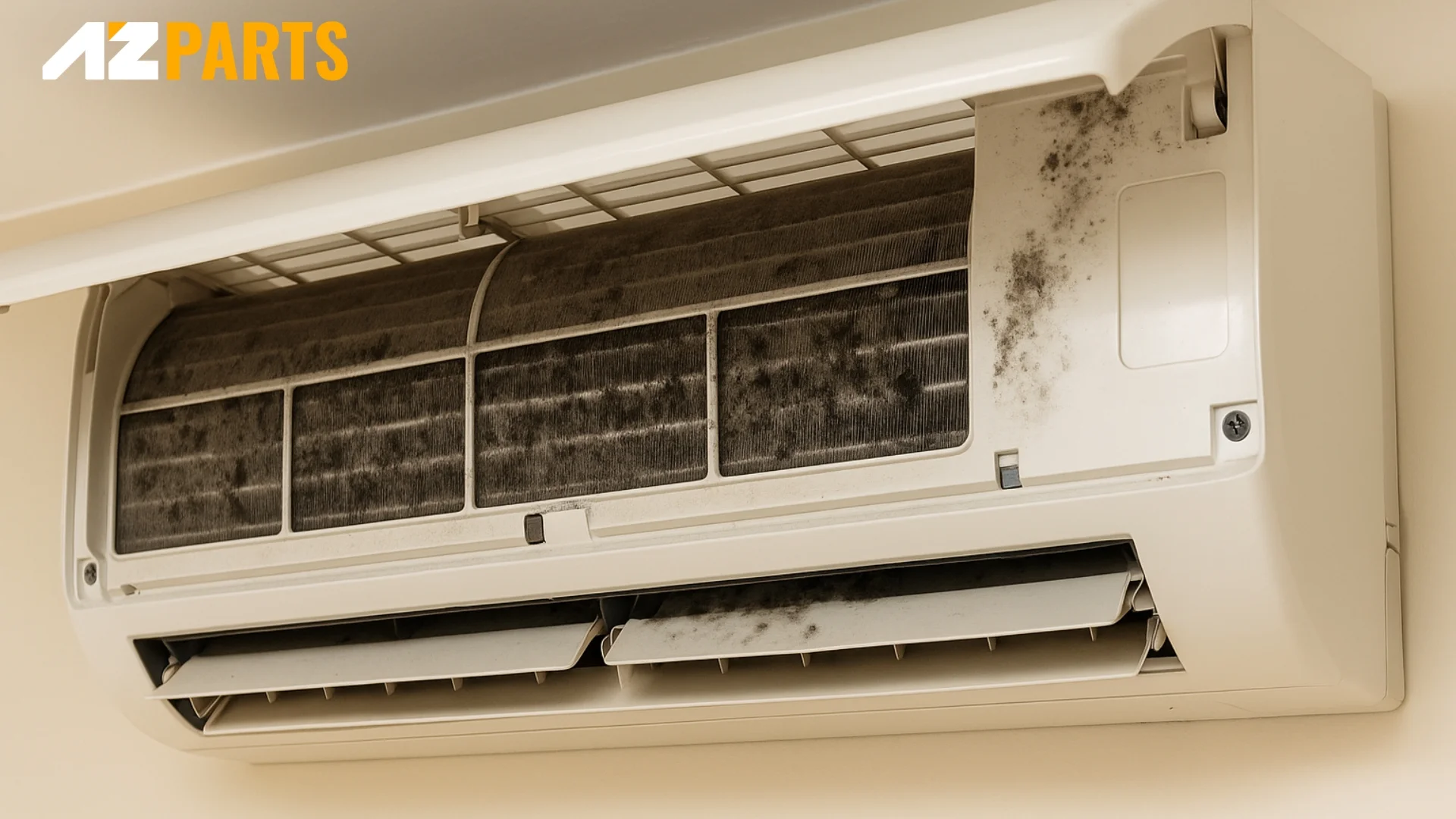
Mold Growth in Your AC Unit (Source: AZParts)
1.2. Rotten Egg or Sulfur Smell
A rotten egg or sulfur-like odor from your AC is a warning sign that something is wrong, usually pointing to a nearby natural gas leak or damaged gas line connector. Over time, valves or adapters can loosen or corrode, causing dangerous leaks. Instead of waiting for the issue to get worse, it’s safer to upgrade these components early.
Solution: This kind of fix is simple and can often be done without calling a technician. If the odor is caused by minor corrosion or loose fittings, carefully checking and cleaning the external connectors may help. However, for any signs of gas leakage or unusual wear, it’s best to stop using the unit and consult a professional technician. Safety always comes first, and early inspection can prevent more serious issues later.
1.3. Dirty Sock Smell
This unpleasant smell often described like dirty socks is caused by mold or bacteria growing on the evaporator coils. One of the main reasons is a damaged or aged coil cover that fails to keep moisture out. When left too long, it spreads stale air every time the AC runs.
Solution:To deal with this unpleasant smell, focus on giving your AC a deep, regular clean, especially around the coil area where mold tends to grow. This doesn't require special tools; just a gentle brush, some warm water, and a mild cleaning agent can go a long way. Pay extra attention to hidden corners where moisture might collect.
1.4. Burning Smell
A burning smell could mean dust is burning off internal parts after inactivity, but if it doesn’t go away, it may be caused by an overheating capacitor or worn wiring. Old capacitors often degrade over time, which can lead to power surges or safety issues.
Solution: If the smell persists, try checking the capacitor. When this part gets too old or damaged, it may overheat and affect overall AC performance. Replacing the capacitor is usually a quick, straightforward task you can do at home using basic tools. And if you’re looking for dependable options, AZParts has you covered with AC capacitors.
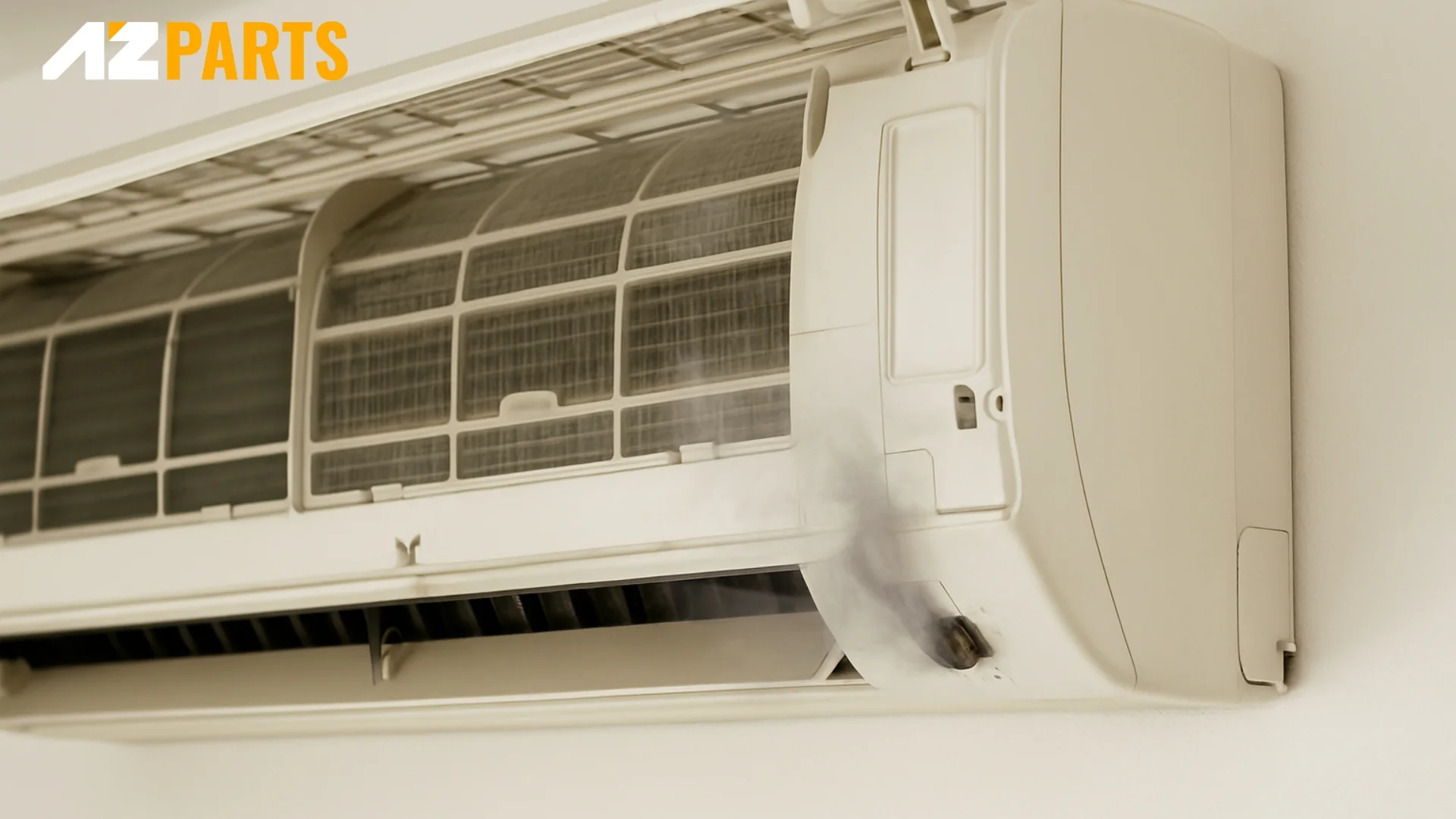
Smoke Emitting from Burnt Component Inside Wall-Mounted AC Unit (Source: AZParts)
1.5. Chemical or Exhaust Smell
If your AC smells like chemicals or car exhaust, it's likely due to a refrigerant leak or a worn valve or adapter inside the system. Over time, these parts may loosen or corrode, allowing refrigerant to escape and reducing cooling performance.
Solution: While some minor odors can be caused by dust or residue, a chemical smell is usually a sign of something more serious. If you notice this issue, it’s best to stop using the unit and have it inspected by a licensed technician. Attempting DIY fixes with refrigerant components isn’t recommended unless you’re certified. Early diagnosis by a professional can help prevent further damage and protect your indoor air quality.
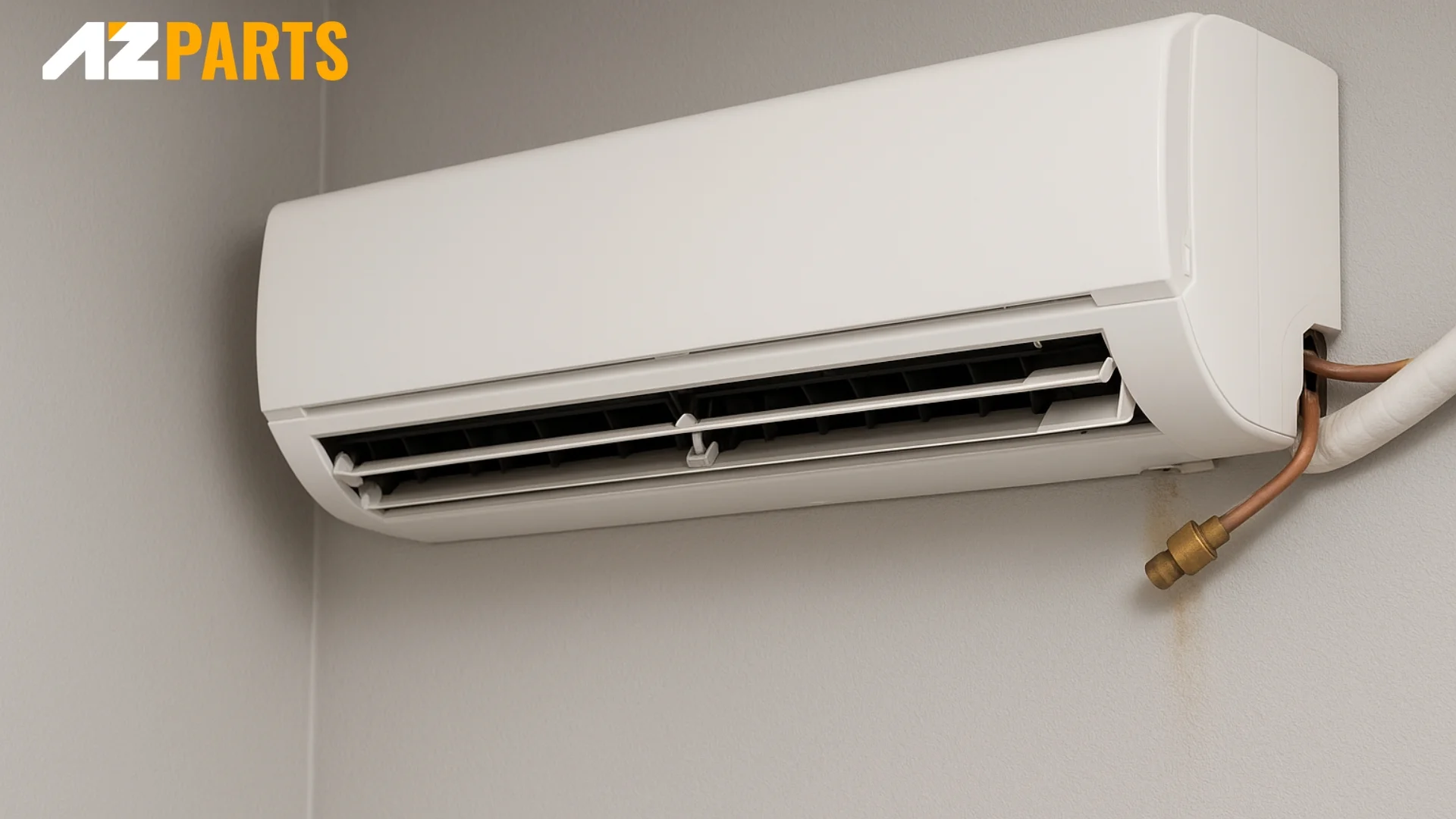
Refrigerant Leak from Air Conditioner Valve Causing Chemical Smell (Source: AZParts)
1.6. Cigarette Smoke Smell
When cigarette particles settle into the AC filter or interior components, they can linger long after smoking has stopped. These residues circulate through the system, gradually creating a stale, unpleasant smell throughout the room.
Solution: Start by giving your unit a deep clean, especially around the filter and inner plastic casing. Use mild soap and a soft cloth to wipe away smoke film. For units that have absorbed too much smoke over time, removing and thoroughly cleaning the cover can significantly reduce odors.
1.7. Trash or Sewer Smell
A foul odor like trash or sewage coming from your AC usually points to a clogged or cracked drain pipe. This can allow stagnant water or gases to collect and enter the airflow. Sometimes, small animals or debris stuck in the drainage system can also be the culprit.
Solution: Inspect the drain pipe and surrounding areas for any blockages or signs of damage. Use warm water or a gentle pipe cleaner to flush out debris. If you notice visible cracks or odors continue, it may be time to replace the vent cover or clean the drain tray manually.
2. Preventing Air Conditioner Odors
The best way to deal with unpleasant AC smells is to stop them before they start. Regular maintenance is key, simple habits like changing or cleaning your air filters every 1 - 3 months can make a huge difference. Clean filters help your system run more efficiently and keep dust, mold, and bacteria from building up.
Another important step is to clear your drain lines and check for leaks regularly. Standing water inside your unit can quickly turn into mold and mildew, which means your home ends up smelling musty. Scheduling an annual tune-up with a trusted HVAC technician helps you catch small issues before they turn into costly repairs.
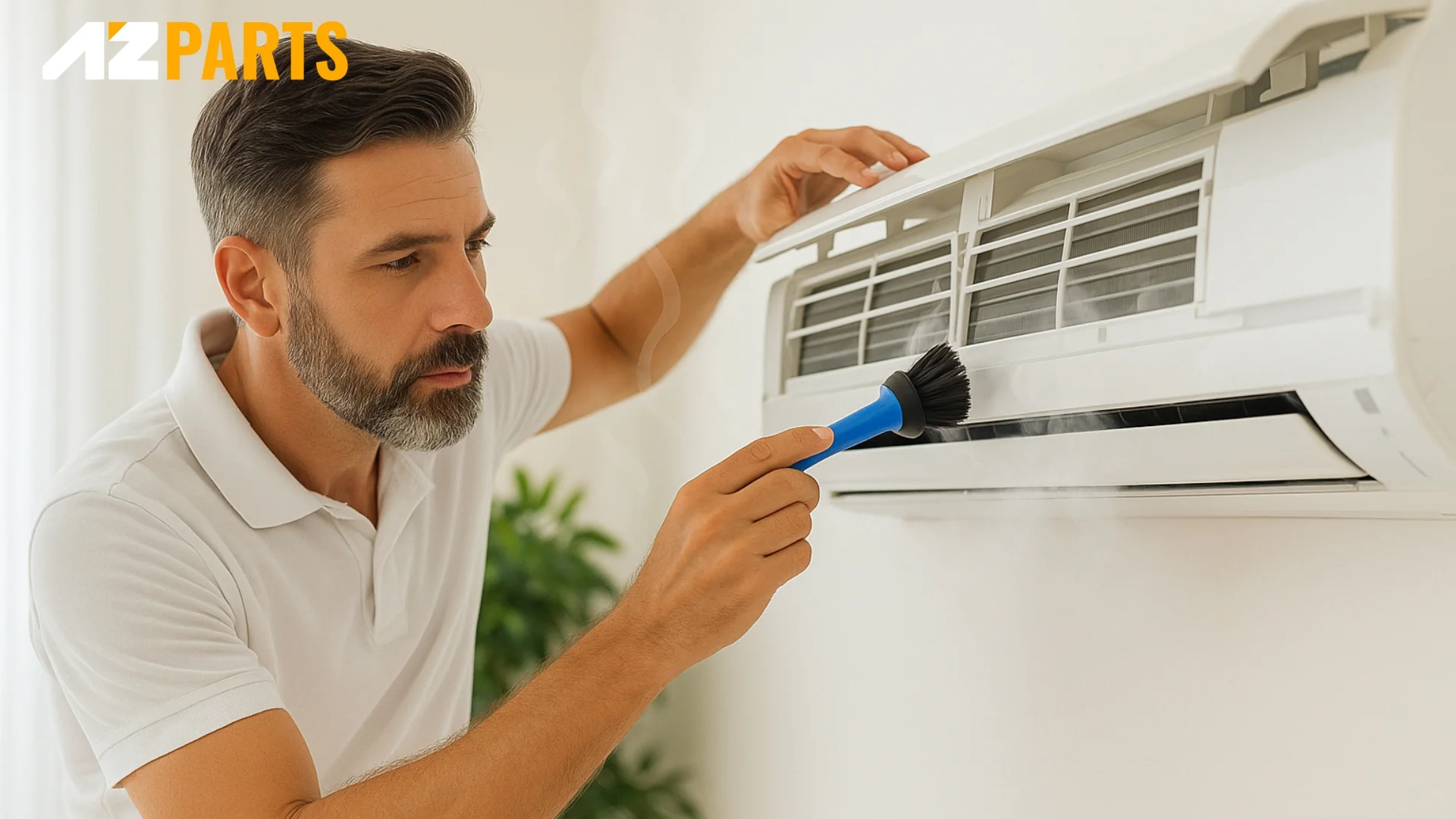
Regular AC Maintenance Against Odors (Source: AZParts)
It’s also worth staying proactive with regular maintenance to keep unpleasant odors from forming in the first place. Simple habits like cleaning filters, checking drain lines, and airing out internal components can make a big difference in long - term performance. When replacement is needed, AZParts offers a reliable source for durable air conditioner components, helping you maintain a clean, efficient system that runs smoothly and keeps unwanted smells away.
3. FAQs about Air Conditioner Smell
3.1. Why is a weird smell coming from my AC?
Unusual odors from your AC can be caused by dirty filters, mold buildup, or burnt components. If the smell doesn’t go away after a basic cleaning, it’s important to inspect the system and replace any faulty or worn-out parts. Using high-quality components like those from AZParts can help eliminate odors and ensure your unit operates safely.
3.2. What does AC mold smell like?
Mold inside an air conditioner typically smells musty similar to damp socks or a humid basement. This indicates that moisture is trapped within the unit, which allows mold and mildew to grow. Cleaning the coils and drain line helps address the issue, while installing AC parts from AZParts can prevent future moisture buildup and keep your air cleaner.
3.3. Is bad AC smell harmful?
Persistent bad smells from your AC may point to serious problems like refrigerant leaks, gas leaks, or bacterial contamination. These can pose health risks if left untreated. Simply masking the smell isn’t enough; You need to identify the source, clean the unit thoroughly, and replace damaged components. Choosing trusted replacements from AZParts helps restore air quality and ensures your system runs safely.
Unpleasant AC smells often come from mold, burnt parts, or leaks—and the best way to fix them is through proper cleaning and part replacement. To keep your AC running well and your air fresh, use quality components you can trust. Browse reliable air conditioner parts at AZParts to solve odor issues fast.
Learn more about other AC' problems and how to fix them:
Contact Info
Address: 8 The Green, Ste A, Dover, Delaware 19901-3618, United States
Email: support@azparts.com
Air conditioner
Further Reading
Further Reading





